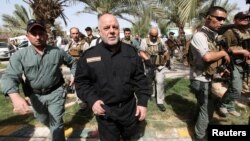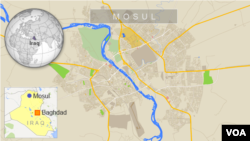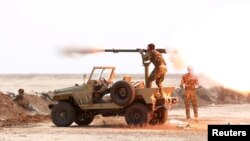Tension between Iraq and Turkey rose a notch Wednesday after a warning by Iraqi Prime Minister Haider al-Abadi that the presence of Turkish troops in the north of the country risked provoking a larger regional confrontation. The growing spat came as military efforts to retake the Iraqi city of Mosul intensified.
The Iraqi government issued a protest to the Turkish ambassador Wednesday, following a late night vote condemning the presence of Turkish troops in the north of Iraq.
The diplomatic dispute comes as Iraq prepares for an impending military operation to retake the country’s second-largest city of Mosul from Islamic State militants.
Prime Minister Abadi warned Turkey that it was risking a regional war by keeping troops inside Iraq, insisting that he’s “warned Ankara more than once against intervening."
The Turkish parliament voted last week to extend Turkey's presence in Iraq for another year to “fight terrorist organizations.” Ankara insists that its troops are present in northern Iraq with the accord of the government in Baghdad.
U.S. military spokesman Lieutenant Colonel John Dorrian told Iraqi state TV that Turkey is “not part of the international coalition” fighting against Islamic State in Iraq.
Abadi’s warning to Turkey came after he told residents of Mosul that military operations to liberate the city were closer than ever, calling on them to cooperate with government forces that are participating in the operation.
Sectarian factor
Ezzedin Dowla, who represents Mosul’s Turkmen minority in the Iraqi parliament, warned that the presence of Shi’ite and Kurdish militiamen in the government force to liberate the city could inflame sectarian tensions.
He said that as “zero hour” approaches for the liberation of Mosul, the news in and around the city is worrisome and that a sectarian war of revenge is possible. He warns that the Mosul suburb of Tal Afar, inhabited by the ethnic Turkmen minority, could be turned into rubble by both Shi’ite and Kurdish militias.
Khattar Abou Diab, who teaches political science at the University of Paris, told VOA that the U.S. “will have a delicate balancing act" in preparing for which forces participate in the actual operations to liberate Mosul.
Iraq’s minister of refugees, Jassem Mohammed, told journalists that his ministry was preparing for humanitarian operations surrounding the battle to liberate Mosul.
He said plans to evacuate the city will be made as military operations evolve. He added that his ministry is expecting 750,000 residents to flee the city (of approximately 1.5 million people), with 500,000 going to refugee camps, and 250,000 to nearby abandoned villages.
Jassem said he was expecting the liberation of Mosul to be a “crisis,” but “not a catastrophe.” Former U.S. ambassador to Iraq Zalmay Khalilzad insisted last week in a press interview that military operations could create over a million refugees.
Current U.S. Ambassador Daniel Silliman told journalists Tuesday that the U.S. will spend $180 million to help Iraqi refugees from the ongoing conflict against Islamic State militants.






